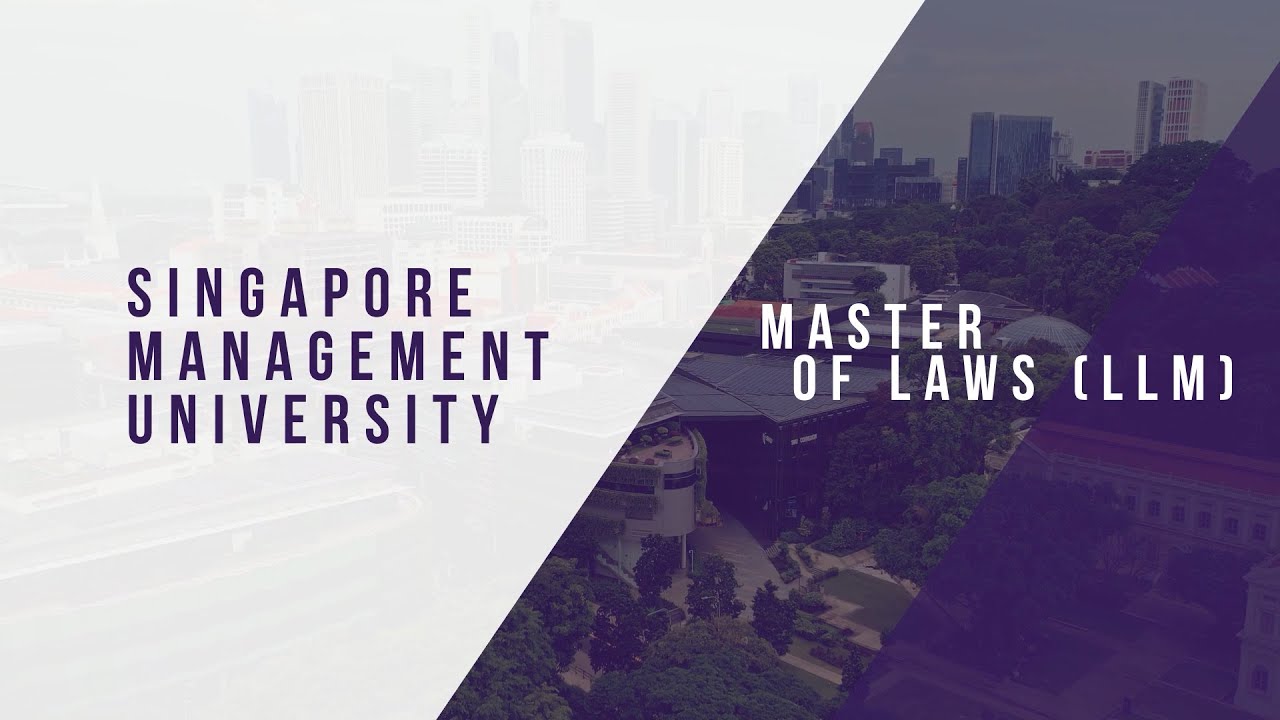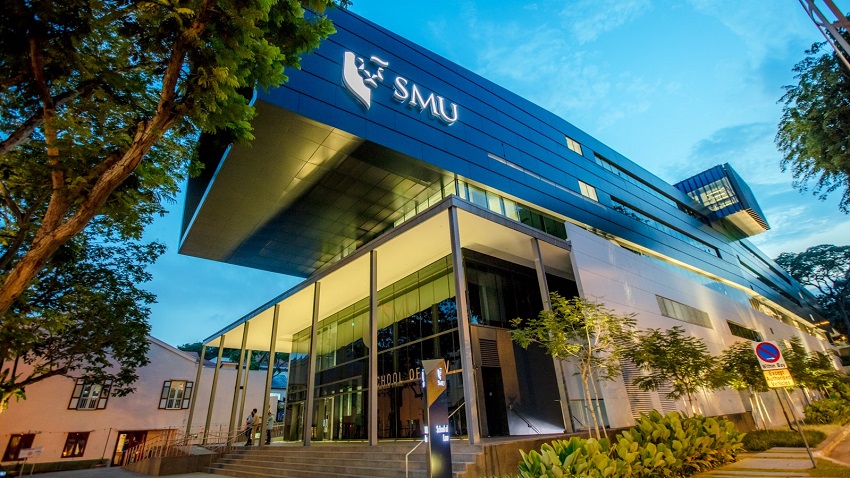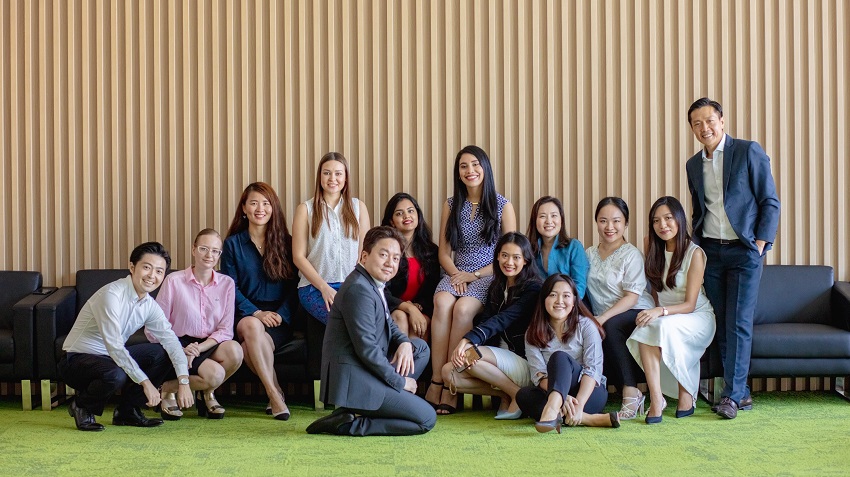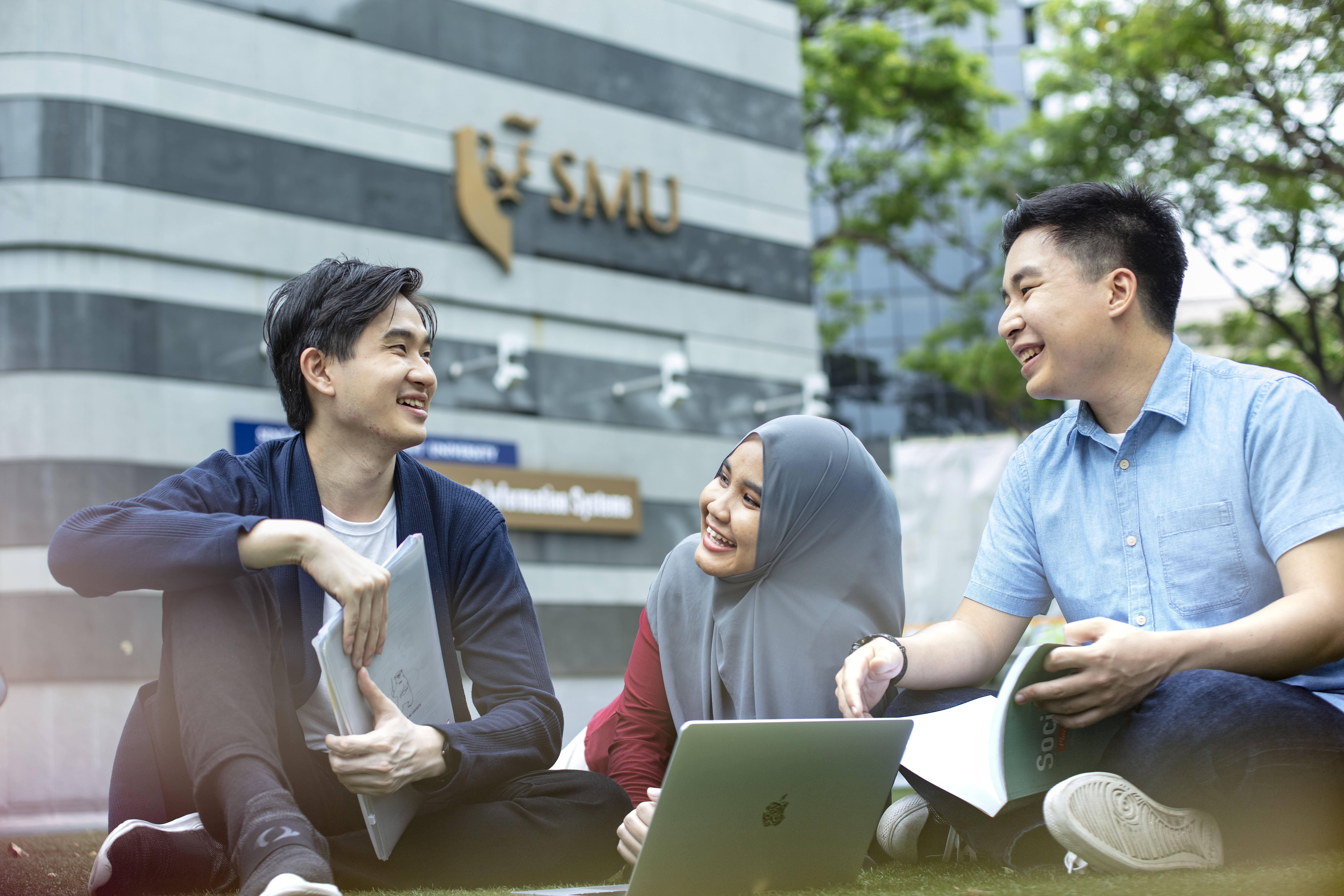-
12
months duration (Full-time)
-
24
months duration (Part-time)
-
S$38,150
Tuition fee (Inclusive of GST, for 2026 intake)
-
Applications Open
Deadline: 15 May 2026
-
4
Tracks are available
About the SMU Master of Laws (LLM)
Singapore, one of the world’s most cosmopolitan cities, has emerged as Asia’s legal and financial hub. As an integral part of the central business district where leading law firms and banks are located, Singapore Management University (SMU) is at the forefront of legal education.
The SMU LLM programme is carefully designed to expand your legal knowledge in classic and novel areas of the law while simultaneously equipping you with the skills-sets essential to render on-point advice on cross-border transactions or deliver high-quality adjudication and judicial administration results.
Our professors, who have gained insight from diverse work experience, will engage you with their interdisciplinary knowledge. Small class sizes allow for highly interactive seminars that also provide a challenging yet collegial learning environment. The School of Law’s active engagement with the legal community, as well as our strong alumni network and the Career Services team, immensely benefits students’ future careers.
The SMU LLM will offer you an unparalleled opportunity for advanced legal education in Singapore and Asia. SMU LLM graduates who are willing to sit for the Bar Exam and practice law in the future could continue applying for the SMU Juris Doctor (JD), they would be granted direct entry without written test and interview if they apply within 3 years of graduation from SMU LLM, and may complete the JD in 2 years instead of 3 with course exemptions. Additional tuition fee discount is applicable.
Why pursue the LLM?
-
1
Advanced Law Degree
1-year full-time or 2-year part-time postgraduate programme
-
2
Non-Law Professionals Welcome
The programme is designed for cross-disciplinary specialisation, with about 20% of each cohort hailing from a wide range of non-legal fields.
-
3
Interactive Pedagogy
Seminar-style learning facilitates stimulating, multi-disciplinary exploration and hones analytical, collaborative and communication skills.
-
4
Cutting-Edge Curriculum
Incorporating the latest research and best business practices, the curriculum includes study tours to leading companies, organisations, and law firms.
-
5
Networking Opportunities
Connect with legal, business, and banking practitioners to gain insights into possible career pathways.
Class Profile
-
 Gender
Gender2 : 3
-
 Typical Age Range
Typical Age Range22-57
-
 Average Age
Average Age39
-
 International Students
International Students65%
-
 Average Years of Work Experience
Average Years of Work Experience11 years
Our global network

Philippines
Singapore
Japan
Thailand
Taiwan (Region)
China
Malaysia
Viet Nam
Nepal
India
Mongolia
South Korea
Kazakhstan
Indonesia
Cambodia
United States of America
Brazil
Panama
France
Germany
Lithuania
Switzerland
Poland
Austria
Russian Federation
Italy
Sudan
Australia
Philippines
Singapore
Japan
Thailand
Taiwan (Region)
China
Malaysia
Viet Nam
Nepal
India
Mongolia
South Korea
Kazakhstan
Indonesia
Cambodia
United States of America
Brazil
Panama
France
Germany
Lithuania
Switzerland
Poland
Austria
Russian Federation
Italy
Sudan
Australia

Testimonials

JUDICIAL STUDIES TRACK
SCIENTIFIC. ARTFUL. JUDICIOUS. TIMELY.
In partnership with the Singapore Judicial College
Advance your adjudication and administration abilities
- 6 core modules, including on judicial decision-making, judicial stress management and judicial philosophy
- 2 interdisciplinary electives
- 1 year (Full-Time)
- 2 years (Extended Duration)
Immerse yourself in the workings of the Singapore judiciary
- Internship opportunities to shadow sitting senior judges
- Fireside chats organised by the Singapore Judicial College
- Experienced judges (co)teach core courses and share first-hand accounts of their time in the courts
- Network with fellow judicial officers from around the region
Embark on a unique academic experience in Singapore
- Seminar-style pedagogy with interactive class discussion
- Practice-oriented content and ample use of court-centric case studies
- Specialised extra-legal courses on management strategies, accounting fundamentals and insights from social science
Message from the Chief Justice
"This programme, the first of its kind in the region, has been designed specifically for serving judges and judicial aspirants. The diverse curriculum is jointly developed and will be taught by professors from the Singapore Management University and experienced Singapore judges. Candidates can expect the academic rigour of higher learning coupled with practical judge-craft. The teaching faculty will be supported by the Singapore Judicial College, which has established a reputation for its practical programmes, which focus on enhancing problem-solving skills. Graduates of this programme will enjoy the privilege of being amongst the first members of a new and growing worldwide alumni of judges."
The Honourable the Chief Justice Sundaresh Menon
Supreme Court of Singapore
|
1-YEAR FULL-TIME |
||
|
PRE-TERM |
TERM-1 |
TERM-2 |
|
August (1 Week) |
Aug - Dec (12 Weeks) |
Jan - Apr (12 Weeks) |
|
Orientation Legal Writing Workshop* Common Law Workshop* |
3 credit units of core modules 1 credit unit of electives |
3 credit units of core modules 1 credit unit of electives |
|
1-YEAR FULL-TIME |
||
|
PRE-TERM |
TERM-1 |
TERM-2 |
|
August (1 Week) |
Aug - Dec (12 Weeks) |
Jan - Apr (12 Weeks) |
|
Orientation Legal Writing Workshop* Common Law Workshop* |
3 credit units of core modules 1 credit unit of electives |
3 credit units of core modules 1 credit unit of electives |
|
2-Year Extended Duration |
||
| Year 1 | ||
|
PRE-TERM |
TERM-1 |
TERM-2 |
|
August (1 Week) |
Aug - Dec (12 Weeks) |
Jan - Apr (12 Weeks) |
|
Orientation Legal Writing Workshop* Common Law Workshop* |
3 credit units of core modules 1 credit unit of electives |
Leave of Absence |
| Year 2 | |
|
TERM-1 |
TERM-2 |
|
Aug - Dec (12 Weeks) |
Jan - Apr (12 Weeks) |
|
Leave of Absence |
3 credit units of core modules 1 credit unit of electives |
|
2-Year Extended Duration |
||
| Year 1 | ||
|
PRE-TERM |
TERM-1 |
TERM-2 |
|
August (1 Week) |
Aug - Dec (12 Weeks) |
Jan - Apr (12 Weeks) |
|
Orientation Legal Writing Workshop* Common Law Workshop* |
3 credit units of core modules 1 credit unit of electives |
Leave of Absence |
| Year 2 | |
|
TERM-1 |
TERM-2 |
|
Aug - Dec (12 Weeks) |
Jan - Apr (12 Weeks) |
|
Leave of Absence |
3 credit units of core modules 1 credit unit of electives |
*Candidates with a civil law background must attend the common law workshop and legal writing workshop.
Asian and Global Trends in IT Law
Candidates will be taken through the many legal issues and problems that arise from and relate to developments in information and communications technology. The course will build problem-solving skills in dealing with a subject matter that is still evolving in the context of a rapidly evolving technology and innovation environment, and that is impacting socio-economic transactions and stakeholders on a global scale.
New legislative developments will also be considered in detail. In particular, more recent amendments to the Electronic Transactions Act of 2010 relating to e-contracts, e-signature and intermediary liability; the enactment of the Personal Data Protection Act in 2012 relating to data protection, the do-not-call registry and the Spam Control Act; changes to content regulations, specifically the class licensing regulations in 2013; the new Protection from Harassment Act and recent amendments to the Copyright Act in 2014 and 2016. The latest trends and developments in other jurisdictions relating to these topics will also be considered.
Asian and Global Trends in IT Law
As business firms expand across the globe, trade regulations also move beyond national borders. The most comprehensive rules on international trade are contained in the Agreements of the World Trade Organization (WTO), which now cover issues including trade in both industrial and agricultural products, trade in services, labor mobility, investment, free trade agreements, health and food safety, and a wide variety of domestic regulatory regimes. Thus, it is important that lawyers advising business firms understand these rules so they may help the clients to structure their transactions to maximize their benefits and minimize the costs. Taught by a former staff member of the WTO Secretariat who is among a handful of people in the world who have worked on WTO cases as an insider at both the panel and Appellate Body levels, the course will help the students to study the legal rules of the WTO and free trade agreements, which cover tariff measures, antidumping and safeguard measures, food safety regulations, as well as domestic regulations of key WTO Members like the US & China. Using real WTO cases decided by the WTO tribunals as examples, the students will be able to critically examine how these rules are made, what are the impacts on business firms, how to argue the best case for their clients, and how these rules could be improved in the future. The knowledge and skills learnt in this course will be helpful for students to participate in various WTO moot courts around the world, and explore a wide range of career options, including private law firms, government agencies (MFA, MTI), multinational companies, and international organizations (WTO, World Bank).
Advanced Law of Obligations
Seminars will cover key aspects of the law of obligations, such as contract law, tort law, trust and equity, and the law of restitution. The focus is on cultivating a thorough understanding of how these various aspects interact, while more practically relevant developments will also be emphasised. The various topics will be taught from a comparative perspective with ample references to ASEAN, Asian and leading common law jurisdictions.
Law of Real Estate Securitisation
While space and the built environment is ubiquitous, real estate remains a unique asset class. The rules relating to its current and future value, how it may be securely transferred from one party to another and its very definition all depend on law. Property development, investment and securitisation are all aspects that real estate market players take cognisance of. This course provides a legal primer on the legal fundamentals of real estate practice, with an emphasis on the regulations pertaining to securitisation of real estate via a Real Estate Investment Trust (REIT) or Business Trust (BT). Where relevant, comparisons with other jurisdictions will be made. The course is both practical and academically rigorous and is relevant to students with an interest in real estate transactions and securitisation.
Please click here for the detailed course outline.
Mediation
This course deals with the rapidly growing area of private international mediation. Imagine the following scenario: You are asked to mediate a professional negligence dispute. The plaintiff is based in England, the defendant accounting firm is in Hong Kong, and the defendant’s insurer has its headquarters in the United States. All agree to attend mediation in Singapore. The preliminary discussions and meetings, however, take place via email and video-conference with all parties in their home countries. The mediation occurs and the parties reach a settlement, which the parties’ legal representatives draft into contractual form. Such cross-border mediations involve:
- international and intercultural competencies;
- online and face-to-face mediation processes and protocols; and
- knowledge of the applicable law in relation to the substantive and procedural aspects of mediation.
This course offers you a framework for understanding cross-border mediation law and practice and the opportunity to develop specialised mediation skills relevant to cross-border settings. Simulated role-play exercises are arranged to develop your skills as a mediator.
Upon successful completion of the course and related assessment, participants will be able to apply to the Singapore International Mediation Institute (SIMI) for mediator accreditation. Participants who wish to do so may inform SIDRA staff at learning@sidra.academy. SIDRA will verify the results of the assessment and refer the participant’s application to SIMI. For more information about the SIMI credentialing scheme, see: http://www.simi.org.sg/What-We-Offer/Mediators/SIMI-Credentialing-Scheme. In addition, participants who complete the course and the related assessment may apply for Australian accreditation through the University of Western Australia. For more information about the application procedure through UWA,please visit: www.mediation.uwa.edu.au.
LLM (JS) candidates will attend extra classes devoted to judicial mediation (featuring faculty who were former and present judicial officers), to provide these candidates with a holistic appreciation of the various parties involved in mediation, their roles and interests as well as necessary skillsets. Besides special talks by judges serving as Judge-Mediators, judicial mediation attachments will also be arranged.
Financial Regulation in Asia
This course will outline key financial regulations in Singapore and Hong Kong, two biggest international financial centres in Asia Pacific, focusing on banking and insurance regulation after the collapse of Lehman Brothers in 2008. Chinese and Taiwanese law will also be introduced and considered to offer a greater understanding of relevant rules in the Greater China region. Main topics covered in this course may include the regulatory structure and power of regulators, systemic risk and macro regulation, licensing and scope of regulation, capital adequacy rules, transfer of control of financial institutions, corporate governance, financial consumer protection, capital market aspect of banking/insurance regulation, and OTC derivatives, etc. Certain private law aspects (such as the interpretation of ISDA master agreement or cross-border loan agreement) may also be incorporated.
Please click here for the detailed course outline.
This course will feature topics relating to judicial decision-making, judicial stress management and judicial philosophy. To supplement the learning, candidates are required to attend any 3 full-day signature programmes on: (a) the art of judging; (b) assessing of credibility of witnesses; (c) effective engagement of litigants-in-person; (d) judgment writing and oral judgments; and (d) leadership in court governance, at the Singapore Judicial College (SJC).
This 5-day executive training program aims to provide participants with foundational knowledge about: (a) leadership skills and facilitating innovation; and (b) key contemporary legal and regulatory issues linked to the proliferation of cross-border transactions, spurred on by ongoing efforts to integrate the economies of the ASEAN states. Participants can look forward to a set of day-long modules crafted with their particular judicial needs in mind. They will learn leadership skills that they can harness to better manage internal judicial processes and improve on the efficiency and quality with which judicial services are delivered to the general public in their respective jurisdictions.
Every candidate must complete a judicial dissertation that may be considered for publication under the auspices of the SJC’s Empirical Judicial Research Programme. Candidates will be supervised either by an experienced law academic or senior Judge depending on the area of empirical research.
The development of international business serves as a vital factor for national economic growth. This is particularly important for many Asian countries, which have adopted an export-oriented policy and promote the export of goods and services in international markets. It is thus critical for Asia-based business leaders and policy-makers to understand legal aspects of domestic and international transactions, as well as global trade regimes. To this end, the course will provide an overview of legal issues that apply to the sale of goods transactions, the meanings and application of trade terms such as CIF and FOB, and methods of financing sales and of transporting goods across borders.
Moreover, the course will discuss the resolution of commercial and investment disputes, and regulatory issues involving trade barriers to foreign direct investments and WTO principles. In particular, we will explore law and policy related to Asian countries and enterprises. You will examine international trade cases and problems from interdisciplinary angles, gain presentation and advice-giving experience and, more importantly, learn to use legal concepts to improve the decision-making process in managing transnational business from the Asian perspective.
This course provides an overview of the fundamental principles and methodologies of the conflict of laws (also known as private international law), with focus on their application in commercial transactions.
Cross-border commercial transactions are common in a modern globalised era. The conflict of laws addresses three large questions: (1) In which country should the case be tried? (2) Which country’s law should be applied to resolve the dispute? (3) What should be the legal effect in one country of a judgement given in another? From the perspective of Singapore law, the questions translate into: (1) When would or should a Singapore court hear the case (and sometimes try to stop it from being heard in another country)? (2) Which country’s law would or should the Singapore court apply to resolve the issue before it? and (3) What legal effect would or should a foreign judgement have in Singapore? This is a course on Singapore conflict of laws, but comparisons will be made from time to time to the laws of other countries.
Law is the leading but certainly not the only regulatory mechanism in the political, social and economic realms. Indeed, a simplistic over-reliance on the law and the legal system in the conduct of business, social and economic matters is inadequate in protecting one’s rights, interests and needs especially when the rule of law is weak. Other regulatory mechanisms that can aid in governance in the public and private realms include ethical value systems, soft law, networks in the various facets of human endeavours. Together with the law, they help to ensure a nuanced way to protect and enhance one’s rights, interests and concerns. This module seeks to develop an appreciation and understanding of these quasi-legal regulatory mechanisms, and how they can be used in conjunction with hard law and the legal system to protect one’s rights and interests, with particular reference to Asia. How can such regulatory mechanisms advance accountability, regulate affairs in the different spheres of human endeavours?
Note: The list of electives is indicative and subject to availability. Electives may include JD courses listed here.
CROSS-BORDER BUSINESS AND FINANCE LAW IN ASIA TRACK
- Introduction
- Track Schedule
- Common Core Courses
- Track Core Courses
- LL.M. Electives (2 credit units)
- Selected JD courses
A DOUBLE-EDGED LEGAL AND BUSINESS ADVANTAGE
Sharpen your legal expertise and understand business practices
- 6 Core Modules
- 2 Electives or Dissertation
- 1 year (Full Time)
- 2 years (Part Time) for working professionals
Interact with global faculty and leading practitioners
- Distinguished faculty with diverse legal expertise in the Asia-Pacific
- Study tours to high-tech companies, international law firms and organizations
- Opportunities to network with legal, business and banking practitioners
- A class comprised of 70% international students with experience in countries such as China, Australia, France, Japan, South Korea, Europe Nations, India, and ASEAN countries.
Embark on a unique academic experience in Singapore
- Vibrant city campus in Asia’s legal and financial hub
- Specialised postgraduate courses on cross-border commercial law, intellectual property law and trade law
- Seminar-style pedagogy of interactive engagement in classes that teach students to solve real-world problems
|
1-YEAR FULL-TIME |
||
|
PRE-TERM |
TERM-1 |
TERM-2 |
|
August (1 Week) |
Aug - Dec (12 Weeks) |
Jan - Apr (12 Weeks) |
|
Orientation Legal Writing Workshop* Common Law Workshop* |
3 credit units of core modules 1 credit unit of electives |
3 credit units of core modules 1 credit unit of electives |
|
1-YEAR FULL-TIME |
||
|
PRE-TERM |
TERM-1 |
TERM-2 |
|
August (1 Week) |
Aug - Dec (12 Weeks) |
Jan - Apr (12 Weeks) |
|
Orientation Legal Writing Workshop* Common Law Workshop* |
3 credit units of core modules 1 credit unit of electives |
3 credit units of core modules 1 credit unit of electives |
|
2-Year Extended Duration |
||
| Year 1 | ||
|
PRE-TERM |
TERM-1 |
TERM-2 |
|
August (1 Week) |
Aug - Dec (12 Weeks) |
Jan - Apr (12 Weeks) |
|
Orientation Legal Writing Workshop* Common Law Workshop* |
2 credit units of core modules |
2 credit units of core modules |
| Year 2 | |
|
TERM-1 |
TERM-2 |
|
Aug - Dec (12 Weeks) |
Jan - Apr (12 Weeks) |
|
1 credit unit of core modules 1 credit unit of electives |
1 credit unit of core modules 1 credit unit of electives |
|
2-Year Extended Duration |
||
| Year 1 | ||
|
PRE-TERM |
TERM-1 |
TERM-2 |
|
August (1 Week) |
Aug - Dec (12 Weeks) |
Jan - Apr (12 Weeks) |
|
Orientation Legal Writing Workshop* Common Law Workshop* |
2 credit units of core modules< |
2 credit units of core modules |
| Year 2 | |
|
TERM-1 |
TERM-2 |
|
Aug - Dec (12 Weeks) |
Jan - Apr (12 Weeks) |
|
1 credit unit of core modules 1 credit unit of electives |
1 credit unit of core modules 1 credit unit of electives |
*Students without a law degree or from a civil law backgroud must attend the Legal Writing workshop and Common Law Workshop
Asian and Global Trends in IT Law
Candidates will be taken through the many legal issues and problems that arise from and relate to developments in information and communications technology. The course will build problem-solving skills in dealing with a subject matter that is still evolving in the context of a rapidly evolving technology and innovation environment, and that is impacting socio-economic transactions and stakeholders on a global scale.
New legislative developments will also be considered in detail. In particular, more recent amendments to the Electronic Transactions Act of 2010 relating to e-contracts, e-signature and intermediary liability; the enactment of the Personal Data Protection Act in 2012 relating to data protection, the do-not-call registry and the Spam Control Act; changes to content regulations, specifically the class licensing regulations in 2013; the new Protection from Harassment Act and recent amendments to the Copyright Act in 2014 and 2016. The latest trends and developments in other jurisdictions relating to these topics will also be considered.
Asian and Global Trends in IT Law
As business firms expand across the globe, trade regulations also move beyond national borders. The most comprehensive rules on international trade are contained in the Agreements of the World Trade Organization (WTO), which now cover issues including trade in both industrial and agricultural products, trade in services, labor mobility, investment, free trade agreements, health and food safety, and a wide variety of domestic regulatory regimes. Thus, it is important that lawyers advising business firms understand these rules so they may help the clients to structure their transactions to maximize their benefits and minimize the costs. Taught by a former staff member of the WTO Secretariat who is among a handful of people in the world who have worked on WTO cases as an insider at both the panel and Appellate Body levels, the course will help the students to study the legal rules of the WTO and free trade agreements, which cover tariff measures, antidumping and safeguard measures, food safety regulations, as well as domestic regulations of key WTO Members like the US & China. Using real WTO cases decided by the WTO tribunals as examples, the students will be able to critically examine how these rules are made, what are the impacts on business firms, how to argue the best case for their clients, and how these rules could be improved in the future. The knowledge and skills learnt in this course will be helpful for students to participate in various WTO moot courts around the world, and explore a wide range of career options, including private law firms, government agencies (MFA, MTI), multinational companies, and international organizations (WTO, World Bank).
Advanced Law of Obligations
Seminars will cover key aspects of the law of obligations, such as contract law, tort law, trust and equity, and the law of restitution. The focus is on cultivating a thorough understanding of how these various aspects interact, while more practically relevant developments will also be emphasised. The various topics will be taught from a comparative perspective with ample references to ASEAN, Asian and leading common law jurisdictions.
Law of Real Estate Securitisation
While space and the built environment is ubiquitous, real estate remains a unique asset class. The rules relating to its current and future value, how it may be securely transferred from one party to another and its very definition all depend on law. Property development, investment and securitisation are all aspects that real estate market players take cognisance of. This course provides a legal primer on the legal fundamentals of real estate practice, with an emphasis on the regulations pertaining to securitisation of real estate via a Real Estate Investment Trust (REIT) or Business Trust (BT). Where relevant, comparisons with other jurisdictions will be made. The course is both practical and academically rigorous and is relevant to students with an interest in real estate transactions and securitisation.
Mediation
This course deals with the rapidly growing area of private international mediation. Imagine the following scenario: You are asked to mediate a professional negligence dispute. The plaintiff is based in England, the defendant accounting firm is in Hong Kong, and the defendant’s insurer has its headquarters in the United States. All agree to attend mediation in Singapore. The preliminary discussions and meetings, however, take place via email and video-conference with all parties in their home countries. The mediation occurs and the parties reach a settlement, which the parties’ legal representatives draft into contractual form. Such cross-border mediations involve:
- international and intercultural competencies;
- online and face-to-face mediation processes and protocols; and
- knowledge of the applicable law in relation to the substantive and procedural aspects of mediation.
Financial Regulation in Asia
This course will outline key financial regulations in Singapore and Hong Kong, two biggest international financial centres in Asia Pacific, focusing on banking and insurance regulation after the collapse of Lehman Brothers in 2008. Chinese and Taiwanese law will also be introduced and considered to offer a greater understanding of relevant rules in the Greater China region. Main topics covered in this course may include the regulatory structure and power of regulators, systemic risk and macro regulation, licensing and scope of regulation, capital adequacy rules, transfer of control of financial institutions, corporate governance, financial consumer protection, capital market aspect of banking/insurance regulation, and OTC derivatives, etc. Certain private law aspects (such as the interpretation of ISDA master agreement or cross-border loan agreement) may also be incorporated.
Foreign Investment Law in Asia
The Foreign Investment Law course involves the study of legal principles applicable to the treatment of investments made by foreign investors. The study of such principles will be undertaken in the context of foreign investments in Asian countries. By the end of the course, students should have a good grasp of the principles of international economic law protecting investors against political risk.
The following topics will comprise the major part of the course:
- The customary international law relating to foreign investment protection. The minimum standard, protection against expropriation, standing to engage in diplomatic protection, the Calvo Clause, Articles on State Responsibility, Exhaustion of local remedies rules, and impact on investment protection treaties.
- Review of investment provisions in Singapore Free Trade Agreements, Singapore’s bilateral investment treaties with ASEAN, other Asian and Pacific Countries.
- Definition of “Investment” in Singapore’s treaties and interpretation of Article 25 of the ICSID Convention. Definition of “investor” in Singapore’s treaties. Principles relating to imputability of conduct to the state.
- Most Favored Nation” and “National Treatment” obligations of host state.
- “Minimum Standard” and “Fair & Equitable” treatment obligation. Same or different?
- Umbrella Clauses: Their scope and significance.
- Other Host Country Obligations: No Performance Obligations and Transfers
- Expropriation I: Types of Expropriation
- Expropriation II: Compensation
- Dispute Settlement Provisions
- Dispute Settlement: Fork in the Road, ICSID, UNCITRAL.
- Using Foreign Investment Law and investment protection agreements to protect and enhance investment.
Please click here for the detailed course outline.
Chinese Contract and Business Law: A Comparative Perspective
Contract law is of primary importance to business and commercial activities. It is also one of the most established areas in China's civil and commercial law system. The course will provide students with a comparative perspective on selected issues in Chinese contract law. It will compare the major rules and principles of contract in common law and Chinese law. At the same time, it will introduce the main features of Chinese legal system and its practice of private law by incorporating the insights from recent studies on Chinese economy, politics and society. Therefore, this course also serves as a foundation for studies in other fields of Chinese business and commercial law. It will cover, among others, contract formation, contract policing, performance and nonperformance, interpretation of contracts, contractual remedies, and rights of third parties. In particular, this course is aimed at achieving three objectives: 1) to understand the basic framework of Chinese contract law as applied by courts; 2) to understand the general civil justice system in China; and 3) to use contract law as a gateway to broader knowledge of the commercial law practice in China.
Please click here for the detailed course outline.
Trusts and Wealth Management in Singapore and Hong Kong
This course examines the rules and standards that govern the subject of compliance and risk management. It will start by examining questions of governance: boards of directors, executives and third party vendors. We then examine the compliance function, organised by the nature of the enforcer: managers, regulators, prosecutors, whistleblowers, and gatekeepers. Next we turn to particular areas of the law: data protection, Prevention of Corruption Act, Foreign Corrupt Practices Act and UK Bribery Act, money laundering and terror financing, and sexual harassment in the workplace. We examine cases where compliance fails (e.g., Enron) and initiatives that go beyond compliance (e.g., codes of ethics, social responsibility standards, and institutional culture). The last part of the course will consider risk management as it pertains to lawyers; topics here include the governance of risk; approaches to risk management; reputational, operational, and enterprise risk; and case studies of instances where risk management failed.
Compliance and Risk Management
Law of Mergers and Acquisitions
This course is designed to provide an overview of the regulation and practice of mergers and acquisitions transactions in Singapore. Where relevant, comparisons with other jurisdictions such as United States (particularly Delaware), United Kingdom, Australia and Hong Kong will be made. The topics that would be covered include mechanics of structuring mergers and acquisitions transactions, the preparatory work that is required in connection therewith, the regulatory environment in which mergers and acquisitions take place, duties of participants engaged in mergers and acquisitions (including legal advisers, financial advisers and directors of acquirers and target companies), deal protections, deal tactics for friendly and hostile bids, disclosure obligations, compulsory acquisitions and financing.
Case studies, particularly in respect of cross-border M&A transactions in Asia, will be used extensively in the course.
Please click here for the detailed course outline.
BEYOND THE LAW: REGULATORY MECHANISMS IN CROSS-BORDER ISSUES IN THE ASIAN CONTEXT
Law is the leading but certainly not the only regulatory mechanism in the political, social and economic realms. Indeed, a simplistic over-reliance on the law and the legal system in the conduct of business, social and economic matters is inadequate in protecting one’s rights, interests and needs, especially when the rule of law is weak. Other regulatory mechanisms that can aid in governance in the public and private realms include ethical value systems, soft law and networks in the various facets of human endeavours. Together with the law, they help to ensure a nuanced way to protect and enhance one’s rights, interests and concerns.
This module seeks to develop an appreciation and understanding of these quasi-legal regulatory mechanisms, and how they can be used in conjunction with hard law and the legal system to protect one’s rights and interests, with particular reference to Asia. How can such regulatory mechanisms advance accountability and regulate affairs in the different spheres of human endeavours?
Issues that could be examined include ethical challenges, management of corruption, ethnic business networks and corporate governance concerns that are prominent features in the Asian business landscape. The module is structured to be based on an eclectic set of readings drawn from different disciplines, broadly comparative in nature and inter-disciplinary at heart.
Coverage of the issues will be both theoretical, as we engage the literature on the various topics; and practical, as we ask questions and explore how different regulatory mechanisms can help to better the implementation of law and contracts in the Asian environment. Designed to explore critically the thematic concerns, this module aspires to equip you with a deeper understanding of the interface of law, business, public policy and society.
INTELLECTUAL PROPERTY LAW AND POLICY: INTERNATIONAL AND ASIAN PERSPECTIVES
It is fair to say that few branches of the law have, in recent times, developed as swiftly and explosively across jurisdictions as the law of intellectual property (IP). In Singapore, this is evidenced by the Government’s push for a sound and comprehensive legal framework for the promotion and protection of IP, and by the setting up of the Intellectual Property Office of Singapore (IPOS) and the IP Academy. More recently, several amendments were made to Singapore’s IP legislation in order to implement the country’s obligations under the United States – Singapore Free Trade Agreement.
You will, in this course, be introduced to the different types of IP rights and the various branches of IP law, in particular the law of copyright, patents and trademarks. Apart from learning the fundamental principles of IP law and the impact of international IP conventions and treaties, we will have the opportunity to explore the various policy issues which underpin much of the IP debate – in particular, controversies surrounding the protection, exploitation and enforcement of IP rights. Through group project work and presentations, we shall also examine how the IP regime operates in appropriate Asian jurisdictions and assess whether the protection and enforcement mechanisms in these jurisdictions measure up to international norms and standards.
The study of IP was, until quite recently, a somewhat esoteric specialisation. Today, IP occupies a central position in the global, knowledge-based economy, and this course should, therefore, appeal to those who wish to equip themselves with knowledge of a burgeoning and highly relevant area of the law.
BLOCKCHAIN AND GOVERNANCE
This course introduces you to the blockchain ecosystem, from concept to evolution, from technologies to applications. It analyses governance structures adopted by the blockchain community and investigate the impact of the blockchain technology on business and commerce. Students will learn the defining characteristics of blockchain technologies and the core components as the foundation of trust in a decentralized setting. Applications of blockchain technology in various domains will be examined, and the appropriate legal and regulatory framework for such applications will be discussed. Co-taught by the faculty members from SOL and SCIS, this course links the technological aspect of blockchain with its socio-economic aspect, and explores sensible regulations built on both aspects. Students will be able to develop a rational view about the potentials and limits of blockchain.
This course focuses on the law of defamation applicable to both domestic and international business contexts. The publication of defamatory statements by business competitors, consumers, employees and members of the public via the Internet and other business modes of communication is a common phenomenon in this globalised world. Cross-border defamation issues such as jurisdiction, choice of law and the enforcement of judgements in Internet defamation cases have assumed greater significance in recent years.
The protection of corporate, business and trading reputations and the available remedies will be examined in light of the right of free speech in international human rights instruments, domestic constitutions and statutes. In addition to the tort of defamation and malicious falsehood (or trade libel), the course may from time to time refer to associated torts such as privacy and passing off, where relevant to business defamation. It will discuss, from a comparative perspective, business defamation in the United Kingdom, the United States, Singapore and selected common law and Asian jurisdictions.
This course provides an overview of the fundamental principles and methodologies of the conflict of laws (also known as private international law), with focus on their application in commercial transactions. Cross-border commercial transactions are common in a modern globalised era. The conflict of laws addresses three large questions: (1) In which country should the case be tried? (2) Which country’s law should be applied to resolve the dispute? (3) What should be the legal effect in one country of a judgement given in another? From the perspective of Singapore law, the questions translate into: (1) When would or should a Singapore court hear the case (and sometimes try to stop it from being heard in another country)? (2) Which country’s law would or should the Singapore court apply to resolve the issue before it? And (3) What legal effect would or should a foreign judgement have in Singapore? This is a course on Singapore conflict of laws, but comparisons will be made from time to time to the laws of other countries.
This module provides an opportunity for you to undertake in-depth research on a legal topic of your choice. It contributes to the development of a wide range of transferable skills such as writing skills, research and methodological skills, analytical skills, independent thinking and project management skills (action planning, time management, monitoring and evaluation). The capacity to produce a clearly structured and well-written piece of work can be highly rewarding from an academic and personal perspective.
Note: The list of electives is indicative and subject to availability. Course offerings are confirmed a year prior to the start of the programme.
- Commercial Conflict of Laws
- Comparative Legal Systems
- Constitutional & Administrative Law (1.5cu)
- Contract Law 1
- Contract Law 2
- Criminal Law (1.25cu)
- Law of Business Organisations (1.5cu)
- Law of Equity & Trusts (1.5cu)
- Law of Evidence
- Law of Property (1.25cu)
- Law of Torts (1.5cu)
- Legal Research & Writing (1.5cu)
- Singapore Legal Systems (0.5cu)
- Legal Theory & Philosophy
- Capstone Project
More JD courses here.
LAW AND TECHNOLOGY TRACK
- Introduction
- Track Schedule
- Common Core Courses
- Track Core Courses
- LL.M. Electives (2 credit units)
- Selected JD courses
PREPARING FOR THE TECH-DRIVEN ERA
The exponential development of new technologies in recent years has significantly reshaped the legal industry, while new legal strategies become increasingly essential to advance the sustainable growth of these technologies. Technological developments are calling for innovative legal and regulatory frameworks to promote their positive impacts on advancing social welfare. In particular, Singapore, for its positioning as a smart nation and an international hub for legal and financial services, has spearheaded many legal reforms that need to be carefully studied and transmitted. This new LLM track is devoted specifically to equipping legal professionals with the essential knowledge and skillsets to prosper in an era when tech-driven social evolvement generates endless challenges as well as opportunities.
|
1-YEAR FULL-TIME |
||
|
PRE-TERM |
TERM-1 |
TERM-2 |
|
August (1 Week) |
Aug - Dec (12 Weeks) |
Jan - Apr (12 Weeks) |
|
Orientation Legal Writing Workshop* Common Law Workshop* |
3 credit units of core modules 1 credit unit of electives |
3 credit units of core modules 1 credit unit of electives |
|
1-YEAR FULL-TIME |
||
|
PRE-TERM |
TERM-1 |
TERM-2 |
|
August (1 Week) |
Aug - Dec (12 Weeks) |
Jan - Apr (12 Weeks) |
|
Orientation Legal Writing Workshop* Common Law Workshop* |
3 credit units of core modules 1 credit unit of electives |
3 credit units of core modules 1 credit unit of electives |
|
2-Year Extended Duration |
||
| Year 1 | ||
|
PRE-TERM |
TERM-1 |
TERM-2 |
|
August (1 Week) |
Aug - Dec (12 Weeks) |
Jan - Apr (12 Weeks) |
|
Orientation Legal Writing Workshop* Common Law Workshop* |
2 credit units of core modules |
2 credit units of core modules |
| Year 2 | |
|
TERM-1 |
TERM-2 |
|
Aug - Dec (12 Weeks) |
Jan - Apr (12 Weeks) |
|
1 credit unit of core modules 1 credit unit of electives |
1 credit unit of core modules 1 credit unit of electives |
|
2-Year Extended Duration |
||
| Year 1 | ||
|
PRE-TERM |
TERM-1 |
TERM-2 |
|
August (1 Week) |
Aug - Dec (12 Weeks) |
Jan - Apr (12 Weeks) |
|
Orientation Legal Writing Workshop* Common Law Workshop* |
2 credit units of core modules< |
2 credit units of core modules |
| Year 2 | |
|
TERM-1 |
TERM-2 |
|
Aug - Dec (12 Weeks) |
Jan - Apr (12 Weeks) |
|
1 credit unit of core modules 1 credit unit of electives |
1 credit unit of core modules 1 credit unit of electives |
*Students without a law degree or from a civil law backgroud must attend the Legal Writing workshop and Common Law Workshop
Asian and Global Trends in IT Law
Candidates will be taken through the many legal issues and problems that arise from and relate to developments in information and communications technology. The course will build problem-solving skills in dealing with a subject matter that is still evolving in the context of a rapidly evolving technology and innovation environment, and that is impacting socio-economic transactions and stakeholders on a global scale.
New legislative developments will also be considered in detail. In particular, more recent amendments to the Electronic Transactions Act of 2010 relating to e-contracts, e-signature and intermediary liability; the enactment of the Personal Data Protection Act in 2012 relating to data protection, the do-not-call registry and the Spam Control Act; changes to content regulations, specifically the class licensing regulations in 2013; the new Protection from Harassment Act and recent amendments to the Copyright Act in 2014 and 2016. The latest trends and developments in other jurisdictions relating to these topics will also be considered.
Asian and Global Trends in IT Law
As business firms expand across the globe, trade regulations also move beyond national borders. The most comprehensive rules on international trade are contained in the Agreements of the World Trade Organization (WTO), which now cover issues including trade in both industrial and agricultural products, trade in services, labor mobility, investment, free trade agreements, health and food safety, and a wide variety of domestic regulatory regimes. Thus, it is important that lawyers advising business firms understand these rules so they may help the clients to structure their transactions to maximize their benefits and minimize the costs. Taught by a former staff member of the WTO Secretariat who is among a handful of people in the world who have worked on WTO cases as an insider at both the panel and Appellate Body levels, the course will help the students to study the legal rules of the WTO and free trade agreements, which cover tariff measures, antidumping and safeguard measures, food safety regulations, as well as domestic regulations of key WTO Members like the US & China. Using real WTO cases decided by the WTO tribunals as examples, the students will be able to critically examine how these rules are made, what are the impacts on business firms, how to argue the best case for their clients, and how these rules could be improved in the future. The knowledge and skills learnt in this course will be helpful for students to participate in various WTO moot courts around the world, and explore a wide range of career options, including private law firms, government agencies (MFA, MTI), multinational companies, and international organizations (WTO, World Bank).
Advanced Law of Obligations
Seminars will cover key aspects of the law of obligations, such as contract law, tort law, trust and equity, and the law of restitution. The focus is on cultivating a thorough understanding of how these various aspects interact, while more practically relevant developments will also be emphasised. The various topics will be taught from a comparative perspective with ample references to ASEAN, Asian and leading common law jurisdictions.
Law of Real Estate Securitisation
While space and the built environment is ubiquitous, real estate remains a unique asset class. The rules relating to its current and future value, how it may be securely transferred from one party to another and its very definition all depend on law. Property development, investment and securitisation are all aspects that real estate market players take cognisance of. This course provides a legal primer on the legal fundamentals of real estate practice, with an emphasis on the regulations pertaining to securitisation of real estate via a Real Estate Investment Trust (REIT) or Business Trust (BT). Where relevant, comparisons with other jurisdictions will be made. The course is both practical and academically rigorous and is relevant to students with an interest in real estate transactions and securitisation.
Mediation
This course deals with the rapidly growing area of private international mediation. Imagine the following scenario: You are asked to mediate a professional negligence dispute. The plaintiff is based in England, the defendant accounting firm is in Hong Kong, and the defendant’s insurer has its headquarters in the United States. All agree to attend mediation in Singapore. The preliminary discussions and meetings, however, take place via email and video-conference with all parties in their home countries. The mediation occurs and the parties reach a settlement, which the parties’ legal representatives draft into contractual form. Such cross-border mediations involve:
- international and intercultural competencies;
- online and face-to-face mediation processes and protocols; and
- knowledge of the applicable law in relation to the substantive and procedural aspects of mediation.
Financial Regulation in Asia
This course will outline key financial regulations in Singapore and Hong Kong, two biggest international financial centres in Asia Pacific, focusing on banking and insurance regulation after the collapse of Lehman Brothers in 2008. Chinese and Taiwanese law will also be introduced and considered to offer a greater understanding of relevant rules in the Greater China region. Main topics covered in this course may include the regulatory structure and power of regulators, systemic risk and macro regulation, licensing and scope of regulation, capital adequacy rules, transfer of control of financial institutions, corporate governance, financial consumer protection, capital market aspect of banking/insurance regulation, and OTC derivatives, etc. Certain private law aspects (such as the interpretation of ISDA master agreement or cross-border loan agreement) may also be incorporated.
This course attempts to define “Artificial Intelligence”, drawing from the history of ideas to outline how our modern understanding of AI develops from a variety of scholarly disciplines and traditions. It also introduces ethics as a self-regulatory framework around Fairness, Accountability, Transparency, Safety, Explainability, and covers current capabilities & applications of AI and technology across different sectors and industries e.g., healthcare, education, autonomous vehicles, financial, legal systems, and the legal profession.
Emerging ethical issues and challenges in AI deployment in the legal sector will be analysed, including the operation of AI and Tech in areas of Public Law – Criminal Law (e.g., crime prediction, policing, algorithmic sentencing) and Family Law. One question would be – How does our understanding of ‘effective’ AI governance sit in relation to the dual-focus on addressing both the near- and long-term challenges of AI?
This course introduces students to topics in digital computing that are increasingly becoming essential for legal professionals who work closely on legal/policy matters relating to technology or those are looking to leverage on the power of modern computing technologies to improve their practice. At the end of the course, participants will have a clearer conceptual understanding of the covered technologies and the trade-offs involved in their adoption.
Topics will be discussed through the lens of larger themes such as trust and reliability to enable a better understanding of the issues likely to be faced by policymakers, regulators and legal professionals as presented by the convergence of technologies that are fast becoming integral to the functioning of modern societies and digital economies. Covered topics include cryptography and cybersecurity, internet technologies such as cloud computing and the Internet of Things (IoT), artificial intelligence, and blockchain-related technologies.
This course focuses on the law of defamation applicable to both domestic and international business contexts. The publication of defamatory statements by business competitors, consumers, employees and members of the public via the Internet and other business modes of communication is a common phenomenon in this globalised world. Cross-border defamation issues such as jurisdiction, choice of law and the enforcement of judgements in Internet defamation cases have assumed greater significance in recent years.
The protection of corporate, business and trading reputations and the available remedies will be examined in light of the right of free speech in international human rights instruments, domestic constitutions and statutes. In addition to the tort of defamation and malicious falsehood (or trade libel), the course may from time to time refer to associated torts such as privacy and passing off, where relevant to business defamation. It will discuss, from a comparative perspective, business defamation in the United Kingdom, the United States, Singapore and selected common law and Asian jurisdictions.
This course provides an overview of the fundamental principles and methodologies of the conflict of laws (also known as private international law), with focus on their application in commercial transactions. Cross-border commercial transactions are common in a modern globalised era. The conflict of laws addresses three large questions: (1) In which country should the case be tried? (2) Which country’s law should be applied to resolve the dispute? (3) What should be the legal effect in one country of a judgement given in another? From the perspective of Singapore law, the questions translate into: (1) When would or should a Singapore court hear the case (and sometimes try to stop it from being heard in another country)? (2) Which country’s law would or should the Singapore court apply to resolve the issue before it? And (3) What legal effect would or should a foreign judgement have in Singapore? This is a course on Singapore conflict of laws, but comparisons will be made from time to time to the laws of other countries.
This module provides an opportunity for you to undertake in-depth research on a legal topic of your choice. It contributes to the development of a wide range of transferable skills such as writing skills, research and methodological skills, analytical skills, independent thinking and project management skills (action planning, time management, monitoring and evaluation). The capacity to produce a clearly structured and well-written piece of work can be highly rewarding from an academic and personal perspective.
As businesses increasingly embrace the use of technology in domestic and cross-border operations, such as blockchain technology, cloud technology, the Internet of Things (IoT) and digitalized trade documents, it is necessary for lawyers and legal policy-makers to not only appreciate the complex legal and policy issues arising from such use of technology, but to also help provide clear legal thinking and innovative ideas in resolving such issues. This unique course aims to provide students with an opportunity to learn about and confront a selection of such issues, develop an understanding of real-world legal-policy issues and exercise skills in critical thinking and creativity to produce usable law and policy recommendations. The issues are selected based on their topicality, feedback from industry, importance to Singapore and ASEAN and a review of academic and business literature. Students will be guided in an exploration and analysis of cross-border trade law issues relating to the intersection of commerce and technology. In the first part of the course, an explanation of the some key issues will be provided to help students understand the broader context of trade in the digital economy. Students will then be exposed to a number of issues which are confronting policy-makers and the private sector, so that they may conduct legal research and craft clear and cogent law and policy recommendations from their findings. Industry professionals will help to provide feedback and discuss students’ findings and recommendations. Industry contacts in this course are likely to be from the fields of finance, technology, commerce, policy/strategy and law.
Note: The list of electives is indicative and subject to availability. Course offerings are confirmed a year prior to the start of the programme.
- Commercial Conflict of Laws
- Comparative Legal Systems
- Constitutional & Administrative Law (1.5cu)
- Contract Law 1
- Contract Law 2
- Criminal Law (1.25cu)
- Law of Business Organisations (1.5cu)
- Law of Equity & Trusts (1.5cu)
- Law of Evidence
- Law of Property (1.25cu)
- Law of Torts (1.5cu)
- Legal Research & Writing (1.5cu)
- Singapore Legal Systems (0.5cu)
- Legal Theory & Philosophy
- Capstone Project
More JD courses here.
DUAL LLM IN COMMERCIAL LAW (SINGAPORE & LONDON) TRACK
EAST MEETS WEST: 1 PROGRAMME, 2 CITIES, 2 DEGREES
Sharpen your legal expertise and understand business practices
- Academically rigorous while providing a deep understanding of commercial law.
- Transits from theory to practice with actual case studies
- Allows students to explore widest possible career options
Interact with global faculty and leading practitioners
- Distinguished faculty with diverse legal expertise in Asia and Europe
- Study tours to high-tech companies, international law firms and organisations
- Opportunities to network with legal, business and banking practitioners
Embark on a unique academic experience in Singapore and London
- Vibrant city campus in the world's legal and financial hubs
- Seminar-style pedagogy of interactive engagement in classes that teach students to solve real-world problems
- Participation in practice-oriented conferences on Asian and European laws
|
Full-time: 16-month duration |
||
|
QMUL LEG |
SMU leg |
|
|
PRE-TERM |
TERM-1 |
TERM-2 |
|
August (1 Week) |
Aug - Dec (12 Weeks) |
Jan - Apr (12 Weeks) |
|
1 compulsory dissertation 1 compulsory module 3 electives |
3 credit units of core modules |
3 credit units of core modules |
|
Full-time: 16-month duration |
||
|
QMUL LEG |
SMU leg |
|
|
PRE-TERM |
TERM-1 |
TERM-2 |
|
August (1 Week) |
Aug - Dec (12 Weeks) |
Jan - Apr (12 Weeks) |
|
1 compulsory dissertation 1 compulsory module 3 electives |
3 credit units of core modules |
3 credit units of core modules |
Modules offered at QMUL
| COMPULSORY MODULES | ELECTIVES (Sample List) |
|
|
Note: Please refer to QMUL website for full list of available electives. Not all electives will be offered each year.
Modules offered at SMU
| COMMON CORE (3 credit units) | ||
| Asian and Global Trends in IT Law / Trade Regulation | Advanced Law of Obligations / Law of Real Estate Securitisation | Mediation / Financial Regulation in Asia |
| TRACK CORE (3 credit units) | ||
| FOREIGN BUSINESS AND INVESTMENT LAW | CORPORATE AND FINANCIAL LAW | TECHNOLOGY LAW AND REGULATIONS |
|
|
|
Note: The list and scheduling of track core modules are subject to change in view of the availability of course instructors.
Foreign Investment Law in Asia
The Foreign Investment Law course involves the study of legal principles applicable to the treatment of investments made by foreign investors. The study of such principles will be undertaken in the context of foreign investments in Asian countries. By the end of the course, students should have a good grasp of the principles of international economic law protecting investors against political risk.
The following topics will comprise the major part of the course:
- The customary international law relating to foreign investment protection. The minimum standard, protection against expropriation, standing to engage in diplomatic protection, the Calvo Clause, Articles on State Responsibility, Exhaustion of local remedies rules, and impact on investment protection treaties.
- Review of investment provisions in Singapore Free Trade Agreements, Singapore’s bilateral investment treaties with ASEAN, other Asian and Pacific Countries.
- Definition of “Investment” in Singapore’s treaties and interpretation of Article 25 of the ICSID Convention. Definition of “investor” in Singapore’s treaties. Principles relating to imputability of conduct to the state.
- Most Favored Nation” and “National Treatment” obligations of host state.
- “Minimum Standard” and “Fair & Equitable” treatment obligation. Same or different?
- Umbrella Clauses: Their scope and significance.
- Other Host Country Obligations: No Performance Obligations and Transfers
- Expropriation I: Types of Expropriation
- Expropriation II: Compensation
- Dispute Settlement Provisions
- Dispute Settlement: Fork in the Road, ICSID, UNCITRAL.
- Using Foreign Investment Law and investment protection agreements to protect and enhance investment.
Please click here for the detailed course outline.
Chinese Contract and Business Law: A Comparative Perspective
Contract law is of primary importance to business and commercial activities. It is also one of the most established areas in China's civil and commercial law system. The course will provide students with a comparative perspective on selected issues in Chinese contract law. It will compare the major rules and principles of contract in common law and Chinese law. At the same time, it will introduce the main features of Chinese legal system and its practice of private law by incorporating the insights from recent studies on Chinese economy, politics and society. Therefore, this course also serves as a foundation for studies in other fields of Chinese business and commercial law. It will cover, among others, contract formation, contract policing, performance and nonperformance, interpretation of contracts, contractual remedies, and rights of third parties. In particular, this course is aimed at achieving three objectives: 1) to understand the basic framework of Chinese contract law as applied by courts; 2) to understand the general civil justice system in China; and 3) to use contract law as a gateway to broader knowledge of the commercial law practice in China.
Please click here for the detailed course outline.
Trusts and Wealth Management in Singapore and Hong Kong
This course examines the rules and standards that govern the subject of compliance and risk management. It will start by examining questions of governance: boards of directors, executives and third party vendors. We then examine the compliance function, organised by the nature of the enforcer: managers, regulators, prosecutors, whistleblowers, and gatekeepers. Next we turn to particular areas of the law: data protection, Prevention of Corruption Act, Foreign Corrupt Practices Act and UK Bribery Act, money laundering and terror financing, and sexual harassment in the workplace. We examine cases where compliance fails (e.g., Enron) and initiatives that go beyond compliance (e.g., codes of ethics, social responsibility standards, and institutional culture). The last part of the course will consider risk management as it pertains to lawyers; topics here include the governance of risk; approaches to risk management; reputational, operational, and enterprise risk; and case studies of instances where risk management failed.
Compliance and Risk Management
Law of Mergers and Acquisitions
This course is designed to provide an overview of the regulation and practice of mergers and acquisitions transactions in Singapore. Where relevant, comparisons with other jurisdictions such as United States (particularly Delaware), United Kingdom, Australia and Hong Kong will be made. The topics that would be covered include mechanics of structuring mergers and acquisitions transactions, the preparatory work that is required in connection therewith, the regulatory environment in which mergers and acquisitions take place, duties of participants engaged in mergers and acquisitions (including legal advisers, financial advisers and directors of acquirers and target companies), deal protections, deal tactics for friendly and hostile bids, disclosure obligations, compulsory acquisitions and financing.
Case studies, particularly in respect of cross-border M&A transactions in Asia, will be used extensively in the course.
Please click here for the detailed course outline.
BEYOND THE LAW: REGULATORY MECHANISMS IN CROSS-BORDER ISSUES IN THE ASIAN CONTEXT
Law is the leading but certainly not the only regulatory mechanism in the political, social and economic realms. Indeed, a simplistic over-reliance on the law and the legal system in the conduct of business, social and economic matters is inadequate in protecting one’s rights, interests and needs, especially when the rule of law is weak. Other regulatory mechanisms that can aid in governance in the public and private realms include ethical value systems, soft law and networks in the various facets of human endeavours. Together with the law, they help to ensure a nuanced way to protect and enhance one’s rights, interests and concerns.
This module seeks to develop an appreciation and understanding of these quasi-legal regulatory mechanisms, and how they can be used in conjunction with hard law and the legal system to protect one’s rights and interests, with particular reference to Asia. How can such regulatory mechanisms advance accountability and regulate affairs in the different spheres of human endeavours?
Issues that could be examined include ethical challenges, management of corruption, ethnic business networks and corporate governance concerns that are prominent features in the Asian business landscape. The module is structured to be based on an eclectic set of readings drawn from different disciplines, broadly comparative in nature and inter-disciplinary at heart.
Coverage of the issues will be both theoretical, as we engage the literature on the various topics; and practical, as we ask questions and explore how different regulatory mechanisms can help to better the implementation of law and contracts in the Asian environment. Designed to explore critically the thematic concerns, this module aspires to equip you with a deeper understanding of the interface of law, business, public policy and society.
INTELLECTUAL PROPERTY LAW AND POLICY: INTERNATIONAL AND ASIAN PERSPECTIVES
It is fair to say that few branches of the law have, in recent times, developed as swiftly and explosively across jurisdictions as the law of intellectual property (IP). In Singapore, this is evidenced by the Government’s push for a sound and comprehensive legal framework for the promotion and protection of IP, and by the setting up of the Intellectual Property Office of Singapore (IPOS) and the IP Academy. More recently, several amendments were made to Singapore’s IP legislation in order to implement the country’s obligations under the United States – Singapore Free Trade Agreement.
You will, in this course, be introduced to the different types of IP rights and the various branches of IP law, in particular the law of copyright, patents and trademarks. Apart from learning the fundamental principles of IP law and the impact of international IP conventions and treaties, we will have the opportunity to explore the various policy issues which underpin much of the IP debate – in particular, controversies surrounding the protection, exploitation and enforcement of IP rights. Through group project work and presentations, we shall also examine how the IP regime operates in appropriate Asian jurisdictions and assess whether the protection and enforcement mechanisms in these jurisdictions measure up to international norms and standards.
The study of IP was, until quite recently, a somewhat esoteric specialisation. Today, IP occupies a central position in the global, knowledge-based economy, and this course should, therefore, appeal to those who wish to equip themselves with knowledge of a burgeoning and highly relevant area of the law.
BLOCKCHAIN AND GOVERNANCE
This course introduces you to the blockchain ecosystem, from concept to evolution, from technologies to applications. It analyses governance structures adopted by the blockchain community and investigate the impact of the blockchain technology on business and commerce. Students will learn the defining characteristics of blockchain technologies and the core components as the foundation of trust in a decentralized setting. Applications of blockchain technology in various domains will be examined, and the appropriate legal and regulatory framework for such applications will be discussed. Co-taught by the faculty members from SOL and SCIS, this course links the technological aspect of blockchain with its socio-economic aspect, and explores sensible regulations built on both aspects. Students will be able to develop a rational view about the potentials and limits of blockchain.
Events

How to Apply
| JUDICIAL STUDIES TRACK | CROSS-BORDER BUSINESS AND FINANCE LAW IN ASIA TRACK | LAW AND TECHNOLOGY TRACK | DUAL LLM IN COMMERCIAL LAW (SINGAPORE & LONDON) TRACK | |
|
Entry Requirements |
Good first degree in Law (LL.B. or J.D. or their equivalent). Significant relevant experience in legal or judicial positions is required. |
Good first degree in Law (LL.B. or J.D. or their equivalent). Non-law graduates may be considered on the basis of substantial relevant professional experience in law-related positions. |
||
|
English Language Proficiency |
Proof of English language proficiency is required for all international applicants except those from English-medium institutions in Australia, Canada, Hong Kong, Ireland, New Zealand, Philippines, United Kingdom and the United States. The minimum English proficiency test requirement is as follows:
Test scores are valid for two (2) years from the test date and applicants should ensure their scores remain valid at the beginning of the application period of for the LL.M track applied for. Applicants intending to take the proficiency test are advised to schedule their test sufficiently early to ensure that their score reports are avaliable before the closing date for the submission of supporting documents. Only official score reports are accepted. |
|||
|
JUDICIAL STUDIES TRACK |
CROSS-BORDER BUSINESS AND FINANCE LAW IN ASIA TRACK |
LAW AND TECHNOLOGY TRACK |
DUAL LLM IN COMMERCIAL LAW (SINGAPORE & LONDON) TRACK |
|
|
Entry Requirements |
Good first degree in Law (LL.B. or J.D. or their equivalent). Significant relevant experience in legal or judicial positions is required. |
Good first degree in Law (LL.B. or J.D. or their equivalent). Non-law graduates may be considered on the basis of substantial relevant professional experience in law-related positions. |
||
|
English Language Proficiency |
Proof of English language proficiency is required for all international applicants except those from English-medium institutions in Australia, Canada, Hong Kong, Ireland, New Zealand, Philippines, United Kingdom and the United States. The minimum English proficiency test requirement is as follows:
Test scores are valid for two (2) years from the test date and applicants should ensure their scores remain valid at the beginning of the application period of for the LL.M track applied for. Applicants intending to take the proficiency test are advised to schedule their test sufficiently early to ensure that their score reports are avaliable before the closing date for the submission of supporting documents. Only official score reports are accepted. |
|||
| Event | Date |
|---|---|
| Online Application Form Submission Deadline | 15 May 2026 |
| Admission Interviews | December 2025 onwards |
| Common Law Workshop / Legal Writing Workshop | August 2026 |
| First Week of Classes | 24 August 2026 |
Judicial Studies Track / Cross-Border Business and Finance Law in Asia Track
Applicants are admitted on a rolling basis. Once the class size is filled, applications for the cohort will close. All other applicants will then be considered for the following year's cohort.
An application is only considered complete when
1. Online application and all required supporting documents are submitted before the deadline.
2. Application fee is paid before the deadline.
Failure to complete the above will render the application invalid.
Shortlisted applicants will be required to take a written test and participate in an interview.
Step 1: Online Application
It is recommended that applicants access the online application platform on a computer instead of a mobile device. Online application step-by-step guidance is available here.
Those completing their first degree by early July of the year of admission (August intake) may also apply with their latest official transcript. You will be asked to submit your final transcript and graduate certificate letter/degree scroll before school starts if you are offered a place in the programme.
An official translation would need to be uploaded for all documents which are not in English. Translation should be certified by the issuing institution or a Notary Public/Commissioner of Oath. Hard copies of required documents are not required during the application stage.
Please don't pay the Optional Fee: 1st Attempt for SMU Admission Test (S$125) if the online application is submitted, SMU Admission Test is not required by the LLM programme.
Any enquiries about the online application, please email at smullm@smu.edu.sg.
The following documents will be required to accompany the online application:
|
Identification document(s): Singapore Citizen: A copy of NRIC Singapore Permanent Resident: A copy of NRIC, passport and re-entry permit Foreigner: A copy of your passport personal particulars page |
Two Referees Two different referees are required. Please indicate the details of two referees in the online application, including name, designation and email. The referees will be automatically notified to complete their evaluations online once the online application is submitted. Where possible, at least one of the references should be from someone who has taught you or supervised your work in university studies. If you have left school for some years and are unable to submit academic references, please provide 2 references from your employers. The contents of the recommendation are confidential. Under no circumstance should the applicant be able to see the contents of the recommendation. |
|
Degree Certificate The original or certified true copy of your bachelor and/or master degree certificate Place and submit all degree certificates in one PDF file |
CV A concise resume that provides chronological information about your educational background, work experiences and accomplishments. |
|
Transcript The original or certified true copy of your official transcript certified by the issuing institution or a Notary Public/Commissioner of Oath |
Statement of Purpose All applicants are required to submit a detailed personal statement in the application system according to instructions. |
|
IELTS/TOEFL English proficiency test results (TOEFL or IELTS) for all international applicants except those from English-medium institutions in Australia, Canada, Hong Kong, Ireland, New Zealand, Philippines, the United Kingdom and the United States. Scores that are more than 2 years old will not be accepted. GRE/GMAT or SMU admission test is not required. |
Application Fee Payment for the application fee must be done via credit card online The check is not acceptable any more Don't pay Optional Fee: 1st Attempt for SMU Admission Test (S$125) |
Step 2: Written Test (Online)
1. All applicants must undergo an LLM written test (1 hour) after completion of the online application.
2. Once supporting documents are verified and completed online recommendation received, the LLM programme office will email applicants to select the written test date via email. Please check your inbox/spam folder and email us if you have not heard from us one week after submission of documents.
3. No legal knowledge is required for the written test. There is no sample paper for reference.
4. The written test will be conducted via a zoom meeting.
Step 3: Admission Interview (Online)
1. Shortlisted candidates will be invited for an admission interview conducted by one faculty member. Interviews will be held individually (1 candidate to 1 interviewer).
2. The interview will be conducted via zoom meeting.
3. No legal knowledge is required for the interview.
QMUL APPLICATION STAGE
Applicants should apply directly to QMUL.
SMU APPLICATION STAGE
SMU LLM programme office will contact you if you are shortlisted by QMUL.
Dual LLM in Commercial Law (Singapore & London) Track
1. All applicants will apply directly to QMUL through QMUL's application portal HERE.
2. The application deadline for January 2024 intake is 10 November 2023.
3. Applicants who are shortlisted by QMUL will proceed to the SMU application stage.
4. You will be required to complete the application form in the SMU system and also pay the application fee. The form will be prefilled with the information that you had provided to QMUL, you will need to fill in the rest of the details that were not provided earlier. Please also ensure that all pre-filled information is correct. You will receive an email with your login ID and password from SMU, along with the login URL.
6. If you did not submit a copy of your passport personal particulars page to QMUL, you are required to submit it to SMU at smullm@smu.edu.sg. You are not required to provide additional supporting documents if these had been provided to QMUL. These include your education transcript and degree scroll, updated CV, personal statement, and referee letter. The original copy of an official translation must be included for all documents which are not in English.
7. Applicants shortlisted by SMU will need to attend an essay test and interview. If you are unable to make it to Singapore for the interview, a Zoom interview can be arranged.
8. After you have attended the interview and essay test, you will hear from QMUL regarding the final results.
Student Pass
International students must possess a valid Student's Pass to be able to study at SMU. SMU will assist in the application of student passes once the offer to the programme is accepted. Under the Immigration Checkpoint and Authorities (ICA) regulations, only international students studying in a full-time programme are allowed to have student passes.
Application for Student's Pass is done online at the ICA website. You must receive a SOLAR application number from SMU before you can submit your application online. Your programme manager will usually initiate the application process in late May/early June. You will be provided with further details after the programme manager has registered you in SOLAR.
Student's Pass applications submitted electronically are generally processed in 5 working days for foreigners who do not require a visa to enter Singapore. For foreigners who require a visa to enter Singapore, the general processing time is 10 working days. Some applications may take a longer time to process.
For students who require visas to enter Singapore, the Student's Pass In-Principle Approval (IPA) letter will include a Single-Journey Entry Visa for your stay in Singapore till you have completed all formalities upon your arrival in Singapore. We will send the IPA letter via email once your Student's Pass application is approved. You can use the letter as a visa to enter Singapore. You are not required to apply for a separate visa.
If you wish to visit Singapore for personal reasons, please refer to the ICA website for a list of countries whose nationals require visas to enter Singapore.
Upon completion of the programme, students will have to give up their student passes. Extension of the student pass is not allowed once a student has completed graduation requirements.
Please note that the University does not sponsor the student's dependents (e.g. spouse, children, parents) for any immigration passes.
For details on student pass, please click here.
Private Accommodation
Private Apartments
You can engage the services of a property agent to help you find an apartment. There will be an agent's fee for this service.
Points to Consider When Choosing Accommodation:
- Rent - This includes the rental amount of the unit, rental deposit, security deposit, administrative charges, agent fees for service rendered, etc.
- Location - Do check whether the apartment/hostel is conveniently located and if public transport, grocery stores, food outlets or banks are easily accessible.
- Length of Lease - The lease of a unit is normally for at least a year. Landlords of private apartments usually ask for up to 3 months' rent as deposit. However, short term lease is available but usually at a higher rental.
- Others - The cost of accommodation depends on several factors such as the locality, type of premises, size, furnishings provided, recreational facilities available, length of lease. Housing in Singapore is generally expensive, especially within the city.
Do note that the contract / tenancy agreement will be made solely between the student and hostel management / owner. Please read the contract / tenancy agreement carefully before you make any commitment.
Cost of Living
Singapore has one of the highest cost of living in South East Asia. Below are estimates of how much is required during your stay in Singapore. They do not include tuition fees and travel expenses from your home country to Singapore.
An international student in Singapore spends, on average, about S$1,000 to S$3,000 a month on living expenses. This amount will, of course, vary depending on your lifestyle and course of study.
This table gives a rough estimate of basic monthly expenditure for an international student in Singapore:
| Item | Cost per Month (SGD) | Comments |
|
Accommodation |
$500 - $2000 |
Rental varies with geographical area, type of accommodation, demand, facilities provided & the number of people sharing, etc |
|
Utilities (including water and electricity) |
$40 - $100 |
|
|
Food |
$300 - $500 |
Based on $10-$15 per day for 3 meals at a foodcourt. |
|
Transportation |
$100 |
Depends on the distance and mode of transport. |
|
Telecommunications |
$50 |
Varies with usage and promotional packages subscribed for telephone services, mobile services and internet access services. |
|
Books & Stationery |
From $100/term |
Booklink at the SMU concourse stocks almost all the required textbooks. |
|
Personal Expenses |
$100 - $300 |
Varies with the individual. Could include expenses on clothes, toiletries, entertainment, haircut, miscellaneous. |
|
Medical Insurance |
|
As a SMU student, you are automatically entitled to SMU Medical Insurance Coverage scheme that covers your basic medical treatment and consultation. |
| Item | Cost per Month (SGD) | Comments |
|
Accommodation |
$500 - $2000 |
Rental varies with geographical area, type of accommodation, demand, facilities provided & the number of people sharing, etc |
|
Utilities (including water and electricity) |
$40 - $100 |
|
|
Food |
$300 - $500 |
Based on $10-$15 per day for 3 meals at a foodcourt. |
|
Transportation |
$100 |
Depends on the distance and mode of transport. |
|
Telecommunications |
$50 |
Varies with usage and promotional packages subscribed for telephone services, mobile services and internet access services. |
|
Books & Stationery |
From $100/term |
Booklink at the SMU concourse stocks almost all the required textbooks. |
|
Personal Expenses |
$100 - $300 |
Varies with the individual. Could include expenses on clothes, toiletries, entertainment, haircut, miscellaneous. |
|
Medical Insurance |
|
As a SMU student, you are automatically entitled to SMU Medical Insurance Coverage scheme that covers your basic medical treatment and consultation. |
For more information on living in Singapore, please click here.
Medical Insurance
Please click here for more details on SMU Medical Insurance Coverage Scheme.
Programme Fees
| Application Fee (non-refundable) | Registration Fee (non-refundable) | Fee | |
|
Law and Technology Track together with Judicial Studies Track and Cross-Border Business and Finance Law in Asia Track |
S$100 (inclusive of GST) |
Singaporeans/SPR: S$400* w/GST |
S$37,450 (inclusive of GST) 1st billing is payable in August: S$16,225 2nd billing is payable in December: S$16,225 |
|
Judical Studes Track |
|||
|
Cross-border Business and Finance Law in Asia Track |
|||
|
Dual LLM in Commercial Law (Singapore & London) Track |
Applicants shortlisted by QMUL will be required to pay to SMU an application fee of S$100 (inclusive of GST) |
The tuition fees are: |
|
Application Fee (non-refundable) |
Registration Fee (non-refundable) |
Fee |
|
|
Law and Technology Track together with Judicial Studies Track and Cross-Border Business and Finance Law in Asia Track |
S$100 (inclusive of GST) |
Singaporeans/SPR: S$400* w/GST |
S$37,450 (inclusive of GST) 1st billing is payable in August: S$16,225 2nd billing is payable in December: S$16,225 |
|
Judical Studes Track |
|||
|
Cross-border Business and Finance Law in Asia Track |
|||
|
Dual LLM in Commercial Law (Singapore & London) Track |
Applicants shortlisted by QMUL will be required to pay to SMU an application fee of S$100 (inclusive of GST) |
The tuition fees are: |
Please note that there will not be any government subsidy for the LL.M. programme, e.g. MOE Tuition Grant, Service Obligation Scheme. All applicants will have to be self-funded.
*Goods and Services Tax (GST) is a tax collected on behalf of the Singapore Government and will be charged at the prevailing rate.
Scholarships and Financial Aid
S$8,000 discount off total tuition fees (from 2025 intake onwards).
S$5,000 discount off total tuition fees (from 2025 intake onwards).
SkillsFuture funding for Singapore Citizens, click here for more details.
The SkillsFuture Level-Up Programme provides Singapore Citizens aged 40 years and above the opportunity to receive the SkillsFuture Credit (Mid-Career) top up of $4,000. This credit is intended to offset out-of-pocket tuition fees, starting from Academic Year 2024/25 intake, commencing on or after 1 May 2024.
From 2025 intake onward, a S$3,000 discount off total tuition fees is granted to students from ASEAN nations.
Tenure & Benefits of the Scholarship
- Four (4) bond-free scholarships per academic year.
- Each scholarship has an annual value of S$10,000.
- Scholarship of $10,000 is disbursed in 2 equal installments of $5,000 to offset tuition fees in Term 1 and Term 2.
- Demonstrate good conduct and compliance with the University’s prevailing code of conduct and other rules and regulations applicable to the scholar.
- Application via an application form is required once applicants accept the offer. Assessment will based on written test and interview scores, and relevant supporting documents. The application form will be sent to all students together with the offer letter.
Eligibility
- Open to all LLM applicants (full-time and part-time) who are offered a place in the programme.
- Must not be a recipient of other scholarship or sponsorship.
- Scholarship offered is only valid in the year of offer, and cannot be carried forward.
The Fangda Partners Scholarship is meant to motivate outstanding candidates who are enrolled on the SMU YPHSL LLM in Law and Technology track, and to spur them on to greater heights of academic excellence and accord appropriate recognition to the recipients of the scholarship for their accomplishments. Tenure & Benefits of the Scholarship
- One scholarship per academic year, with a total of three bond-free scholarships from AY2022/2023 to AY2024-2025.
- Each scholarship has an annual value of S$20,000.
- The scholarship will offer financial support towards tuition costs and/or other study-related expenses.
- Fangda Partners (Donor) may offer internship opportunities to the scholarship recipients.
Eligibility
- Candidates shall be full-time students at SMU YPHSL enrolled in the LLM in Law and Technology track.
- Candidates shall possess good academic results.
- If there are two or more candidates deserving of the scholarship, preference shall be accorded to candidates from Mainland China, Hong Kong, Macau and Taiwan.
The Jones Day Foundation has graciously decided to fund up to four Jones Day Master of Laws in Judicial Studies Scholarships for outstanding candidates enrolled in this programme at the SMU Yong Pung How School of Law, starting in AY 2020/2021. This scholarship demonstrates the Jones Day Foundation’s commitment to enhancing the rule of law by increasing the competency of judges and standing of judiciary in the region.
Eligibility
Candidates must:
- Have been accepted into the LLM (Judicial Studies), either on a full-time or extended duration basis;
- Not be a Singapore citizen or Singapore Permanent Resident;
- Hold an LLB or JD from a reputable law school;
- Demonstrate strong leadership aspirations and abilities;
- Present strong professional references
Interested candidates can apply once they have received the offer to take up the LLM (Judicial Studies) degree at the SMU Yong Pung How School of Law. In support of your application, you must provide a personal statement of between 500 and 1,000 words, alongside documentation that proves financial need, if applicable. In the personal statement, you may wish to highlight the anticipated impact of the degree on your current or future career, the reasons for your interest in the degree as well as any noteworthy personal or professional achievements to date. Short-listed candidates may be interviewed. The School will make a good faith effort to ensure that the available scholarships will benefit a diverse range of meritorious candidates, with reference to such factors as gender, cultural background, national origin, socio-economic background and financial need.
Tenure & Benefits of the Jones Day Master of Laws (Judicial Studies) Scholarship:
- Four (4) Jones Day (Judicial Studies) Scholarships for international candidates of S$40,000 (inclusive of GST) each for candidates commencing their studies in AY 2020/2021 or AY 2021/2022;
- Two (2) Jones Day (Judicial Studies) Scholarships for international candidates of S$40,000 (inclusive of GST) each for candidates commencing their studies in AY 2022/2023;
- Throughout the duration of the scholarship, the scholar will be required to demonstrate good conduct and compliance with the University’s prevailing rules in this regard;
- This scholarship is bond-free.
Notes and exclusions:
* Matriculated candidates who opt to defer their admission offer or studies will not be able to carry forward the scholarship.
* Candidates cannot simultaneously hold any other scholarships.
The best performing graduate of the LLM in Judicial Studies will receive the Jones Day Top Scholar Award, awarded by the Yong Pung How School of Law once per annum.
Each award has a monetary value of S$10,000 (inclusive of GST).
The Top Scholar Award will be presented to the winner during the SMU Convocation Ceremony or another appropriate University event.
The Lee Foundation has graciously decided to make available up to six annual Lee Kong Chian Master of Laws (Judicial Studies) Scholarships for outstanding candidates enrolled in this programme at the SMU Yong Pung How School of Law. The scholarships are intended to off-set the tuition fees charged for the LLM (Judicial Studies) and cannot be used to defray living expenses. Up to six scholarships will be awarded each year to up to four Singapore citizens or permanent residents and up to two international candidates. Each scholarship is tenable for the full duration of the scholar’s studies, subject to continued observance of the eligibility criteria.
Eligibility
Candidates must:
- Have been accepted into the LLM (Judicial Studies), either on a full-time or extended-duration basis;
- Hold an LLB or JD from a reputable law school;
- Demonstrate strong leadership aspirations and abilities;
- Present strong professional references;
Special consideration may be given to candidates who demonstrate financial need, in particular those from non-OECD countries.
Interested candidates can apply once they have received and accepted the offer to take up the LLM (Judicial Studies) degree at the SMU Yong Pung How School of Law. In support of your application, you must provide a personal statement of between 500 and 1,000 words, alongside documentation that proves financial need, if applicable. In the personal statement, you may wish to highlight the anticipated impact of the degree on your current or future career, the reasons for your interest in the degree as well as any noteworthy personal or professional achievements to date. Short-listed candidates may be interviewed.
Tenure & Benefits of the Lee Kong Chian Master of Laws (Judicial Studies) Scholarship:
- Four (4) Lee Kong Chian Master of Laws (Judicial Studies) Scholarships for Singapore Citizens and Singapore Permanent Residents of S$20,000 (inclusive of GST) each;
- Two (2) Lee Kong Chian Master of Laws (Judicial Studies) Scholarships for international candidates of S$40,000 (inclusive of GST) each;
- Throughout the duration of the scholarship, the scholar will be required to demonstrate good conduct and compliance with the University’s prevailing rules in this regard;
- This scholarship is bond-free.
Notes and exclusions:
* Matriculated candidates who opt to defer their admission offer or studies will not be able to carry forward the scholarship.
* Candidates cannot simultaneously hold any other scholarships.
Discounts
SMU undergraduate and postgraduate alumni who are offered a place in the LL.M. programme will automatically be granted a 10% discount of the LL.M. tuition fee. The 10% discount will be spread equally over the two payment instalment periods. SMU exchange and non-graduating students are not eligible for the alumni discount.
JD Direct Entry for SMU LLM Alumni
SMU LLM alumni who apply to the J.D. programme within three (3) years of obtaining their SMU LLM degree and have a CGPA of 3.4 (based on 8 graded modules) don't need to sit for the written test or interview. They will be granted direct entry to the J.D. programme after completion of their online application and payment of their application fees.
Course Exemption for SMU LLM Alumni
With effect from the 2023 JD admission intake, SMU LLM alumni who fulfil all requirements below can be exempted up to 8 credit units (CUs) law modules (course code starts with LAW)* from the total 25 CUs of the JD programme. The grade point obtained from the exempted Law courses will be computed into the JD GPA.
1. Admitted to the JD programme within three (3) years of obtaining the SMU LLM degree.
2. The grade of exempted modules should be at least B. (Students will not be allowed to re-take modules completed with at least a B grade).
3. LGST courses, LAW652 and other universities’ courses taken on exchange do not qualify for exemption.
* Only graded LAW modules can be transferred to the SMU JD programme.
Tuition Fee Discount (From 2025 Intake)
1. A S$8,000 SMU Alumni Discount on tuition fees.
2. An additional $3,000 discount on tuition fees of the JD programme for each CU exempted, up to 4CUs.
More details about the SMU Juris Doctor (JD) programme, please check here.

FAQ
The LLM is not a qualifying law degree in Singapore. Should you wish to qualify for the Singapore Bar, please apply for the 3-year full-time Juris Doctor Programme (JD) instead. A qualified foreign lawyer may become a Registered Foreign Lawyer, or take the Foreign Practitioner Examination administered by the Singapore Institute of Legal Education.
No, LLM classes are exclusive to postgraduate students.
As the content and approach in courses vary widely from institution to institution, the policy is not to grant exemptions or credit transfers.
Yes. Applicants can seek to audit selected courses in the programme. More details on auditing the LLM can be found here.
Yes, core LLM modules are accredited by the Singapore Institute of Legal Education and fulfil the mandatory Continuing Professional Development (CPD) requirements.
The LLM requires a basic law degree. However, those with substantive knowledge of the law may be considered on an individual basis. In the past, candidates with substantial experience in accounting firms and regulatory bodies such as the Monetary Authority of Singapore have been admitted into the programme.
No, you do not. If your postgraduate degree is from English-medium institutions in Australia, Canada, Hong Kong, Ireland, New Zealand, Philippines, United Kingdom and the United States, you do not need to take the English proficency test.
As a SMU full-time matriculated international student holding a valid student pass, you may take up employment in Singapore during the vacation and are exempted from applying for a work permit as stated in the Work Permit Exemptions Notification. However, during the term time, a student holding a valid student pass is only allowed to work part-time of less than 16 hours per week. A letter of consent is not required from the Immigration and Checkpoints Authority of Singapore or the university.
For more information, please refer to MOM-Employment of Foreign Students.


















